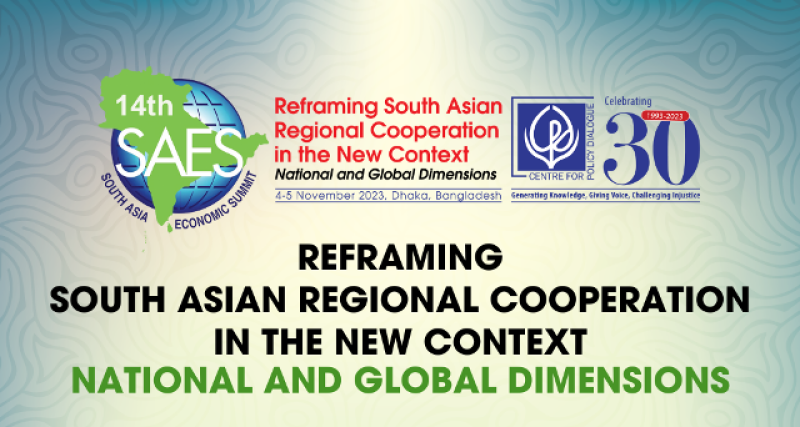- Remittance surges to $2.68 billion in 29 days of November |
- Probe body says Hasina had 'green signal' for BDR Carnage |
- BDR mutiny was conspiracy to destabilise BD: Inquiry chief |
- Teesta Bundh ‘renovation’ in Rangpur turns into a 'sand bonanza' |
- সমুদ্র থেকে লাইটার জাহাজে লাফিয়ে উঠলো ৩ মণ ইলিশ |
SAARC must have scope for conflict resolution to be operational

14th South Asia Economic Summit organised by the Centre for Policy Dialogue ended in the capital on.Sunday
Shahidul Haque, former foreign secretary, said Bangladesh is skillfully playing a policy of equidistance in the given geopolitical context of south Asia. Being at the centre of the Bay of Bengal it has to play a role. Currently two models are abailable - the US model, the China model and a question whether there is a third model and that's of India.
SAARC was created as a platform to discuss and carry forward cooperation. It has not served its purpose. New realities have created scopes for collaboration. There are opportunities in respect of Bay of Bengal.
He waa speaking at a two-day 14th South Asia Economic Summit organised by the Centre for Policy Dialogue marking its 30th anniversary in Dhaka with a call for regional economic integration with Prof Raunaq Jahan, distinguished fellow of CPD in the chair.
Dr. Syed Kaleem Imam, former federal secretary, Government of Pakistan is it a question of prosperity or a question of existence. I believe its a question of existence now. SAARC is limping, there might be many other groups but SAARC must remain and we must cooperate.
The large countries must realise they have roles to play. South Asian countries have challenges, some of the smaller countries facing pressure. There are also presures of change in global and regional trading. There is not only multilaterism but also multipolarism. As the largest country in the region India has to take others together. Leave no one behind.
Dr. Amena Mohsin, Department of International Relations, Dhaka University said we should have clear idea of what kind of South Asia we want to have. We draw from historical animousity. There are the states. But there are aslo the people of the region. We have to think of border lands too. When talking of subregionalism we should also think of what happens to Afganistan. People ha been too much under regimes and statism.
The role of the US has created opportunities for India and also small countries which are seeking multiple allianves. India has a major role other countries want India to be equal partner and not a hegemon.
Dr. Praveen Jha, Jawaharlal Nehru University, India said South Asia can't be taken out of global context. What we look forward to growth fundamentalism or infrastructure fundamentalism sans job creation. Many people are becoming poor. We don't think of what should be taken up for collective persual. About what India is heading for, perhaps it itslf doesn't know. In the neoliberal globalization 70 financial conglomerates and 18 big states that play the bigger roles. Hegemony of capital and finance. China has done far better in this regard in the last 50 years. In last UN meet Xi said to US we are partners, not rivals.
In South Asia last ten years has been much of a lip service at the political level regardless of economic dynamics.
Brig Gen Dr. Sakhawat Hossain, former election commissioner of Bangladesh said SAARC idea was mooted in late seventies and the aim behind was economic prosperity. India the bigger power in South Asia but has not succeeded take other countries with it. China-India contest has taken ovee now. India is in league with the US. India sought leave Pakistan alone.
No communication between Bangladesh and Pakistan and Afghanistan which is not recognised by SAARC countries. For SAARC to be operational there should be mechanisms for conflict resolution. Otherwise it has no future.
Sachin why focus only on the role of India why not talk of roles played by other countries too to make regional cooperation operational. For free movement we may go for a SAARC visa.
The penalists discussed the contestation among the big powers is affecting relations among SAARC countries. India Pakistan cooperation is vital to take forward cooperation under the SAARC said Gen (Retd) AMSA Amin.
Dr. Swarnim Wagle, member, Nepal Parliament said there are proponents of development and that of security but the two groups do not talk to each other.

